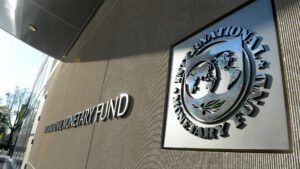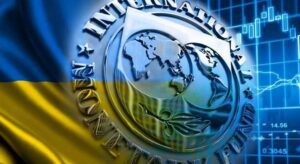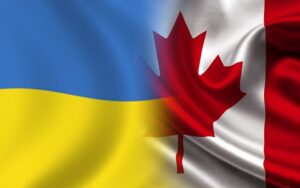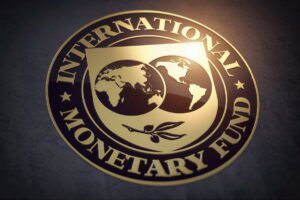
The International Monetary Fund (IMF) left unchanged its July forecast for global economic growth in 2022 – 3.2% (in January, an increase of 4.4% was expected, in April – by 3.6%). For 2023, the estimate is lowered to 2.7% from 2.9% in July and 3.6% in April (in January, the IMF predicted global GDP growth of 3.8%).
“The global economy continues to face serious challenges caused by the lingering impact of three powerful forces: the Russian invasion of Ukraine, the “cost of living crisis” caused by persistent and increasing inflationary pressures, and the slowdown in China. (…) GDP of countries representing more than a third of the world economy will contract in 2023, while the three largest economies – the US, the European Union and China – will continue to slip. In short, the worst is yet to come, and for many, 2023 will feel like a recession,” the report says.
Russia’s war against Ukraine has triggered an energy crisis in Europe that is drastically increasing the cost of living and hindering economic activity, the IMF writes. “Gas prices in Europe have more than quadrupled since 2021, with Russia cutting deliveries to less than 20% of 2021 levels, raising the possibility of power shortages next winter and beyond. More broadly, the war has also pushed up food prices on world markets, despite the recent decline in prices following the Black Sea grain deal, which has caused severe hardship for low-income families around the world, especially in low-income countries.
The report also notes that sustained and rising inflationary pressures have caused a rapid and synchronized tightening of monetary conditions, along with strong dollar appreciation against most other currencies. “Tighter global monetary and financial conditions will affect the economy, reducing demand and helping to gradually curb inflation. However, so far, price pressures remain quite persistent and are of great concern to policymakers. We expect global inflation to peak at the end of 2022, but will remain high for longer than previously expected, falling to 4.1% by 2024.
COUNTRY ASSESSMENTS
The IMF insignificantly, but still improved its forecast for the growth of the economies of emerging markets and developing countries for 2022 – to 3.7% from 3.6% (in April it expected 3.8%), for 2023 – lowered to 3. 7% from 3.9% (April – 4.4%).
The growth forecast for the Chinese economy this year has been worsened to 3.2% from 3.3% (in April, an increase of 4.4% was expected, in January – by 4.8%), in 2023 – to 4.4% from 4 .6% (April estimate – 5.1%).
India’s GDP growth estimate has also been reduced to 6.8% from 7.4% (April – 8.2%) in 2022, and remained unchanged for 2023 – 6.1% (April – 6.9%).
At the same time, the growth forecast for the Brazilian economy has been significantly increased for 2022 – up to 2.8% from 1.7% in July and 0.8% in April, for 2023 it has also been increased – up to 1% from up to 0.9% (April forecast – 1.4%).
The estimate of GDP growth in developed countries in 2022 is worsened by 0.1 percentage points – up to 2.4% (April – 3.5%) and by 0.3 percentage points. – up to 1.1% – in 2023 (2.4% – April estimate).
The IMF continued to reduce the forecast for US GDP growth in 2022 – by 0.7 percentage points. to 1.6% (April – 3.7%). The following year, the estimate remained the same – 1% (April – 2.3%).
The economy of the eurozone countries this year, according to the IMF, will grow by 3.1%, the forecast has been improved from 2.6% in July and 2.8% in April). For 2023, the estimate is downgraded by 0.7 p.p. – up to 0.5% (April – 2.3%).
Italy’s 2022 GDP growth forecast has been raised to 3.2% from 3% in July and 2.3% in April. In 2023, the IMF expects the economy to decline by 0.2%, in July it predicted an increase of 0.7%, in April – by 1.7%.
The German economy in 2022 will grow, according to the IMF, only by 1.5% (better than the July forecast – 1.2%). At the same time, in 2023, the economy is expected to decline by 0.3% (in July, an increase of 0.8% was expected, in April – by 2.7%).
The forecast for Spain for the current year has been raised to 4.3% from 4% (in April – 4.8%) and lowered to 1.2% from 2% in 2023.
For France, the estimate for the current year has been improved to 2.5% from 2.3% and by 0.4 percentage points, for 2023 it has been worsened to 0.7% from 1%.
The growth forecast for the UK economy for 2022 has been improved to 3.6% from 3.2%, for 2023 it has been worsened to 0.3% from 0.5%. Japan’s GDP growth estimate for the current year remained at the level of 1.7%, for 2023 it decreased to 1.6% from 1.7%.

President of Ukraine Volodymyr Zelensky has welcomed the decision of the International Monetary Fund (IMF) to provide Ukraine with a $1.3 billion tranche.
“The Executive Board of the IMF has just supported the provision of about $1.3 billion to Ukraine under the Rapid Financing Instrument. The money will go to Ukraine today. Thanks Kristalina Georgieva and the IMF Executive Board for the support!” he said on Twitter on Friday.
In turn, Ukrainian Prime Minister Denys Shmyhal also said that the IMF will provide Ukraine with additional $1.3 billion.
“This means that the financing from the Fund since the beginning of the war will total $2.7 billion. The tranche will be directed at the support for our defense capacity, payment of pensions and social programs, as well as our economic resilience,” he said on the Telegram channel.
Ukraine’s international partners have provided it with around $20 billion since the beginning of the full-scale war. Thanks to this assistance “we understand how we can finance all necessary expenditures this year,” the PM said.
“We are expecting a new large IMF program next year, as well as financing from the U.S., the EU and other G7 Member States,” Shmyhal said.

The Executive Board of the International Monetary Fund (IMF) has approved $1.3 billion in emergency financial support for Ukraine under the new Rapid Financing Instrument (RFI) food shock window to meet Ukraine’s urgent balance of payments needs.
“More than seven months after the start of the Russian invasion of Ukraine, humanitarian and economic losses remain enormous, leading to large and urgent fiscal and external financing needs,” the IMF said on its website on Saturday night.
The IMF points out that the scale and intensity of Russia’s war against Ukraine, which began more than seven months ago, has caused enormous human suffering and economic damage. With massive population displacement and destruction of housing and basic infrastructure, Ukraine’s real GDP is projected to contract by 35% in 2022 compared to 2021, and financing needs remain very large.
“This RFI payment (equivalent to 50% of Ukraine’s IMF quota) will help meet the urgent needs of the balance of payments, including due to a large reduction in grain exports, and will also play the role of a catalyst for further financial support from Ukraine’s creditors and donors,” the Fund stressed.
The IMF noted that the Ukrainian authorities are to be commended for maintaining largely macro-financial stability in these extremely challenging circumstances and have requested board-level monitoring of the program to bolster their policy commitment and further galvanize donor support.

The Board of Executive Directors of the International Monetary Fund (IMF) approved the provision of additional assistance to countries suffering from a significant balance of payments deficit, within which Ukraine plans to receive $1.3 billion in assistance, the press service of the National Bank of Ukraine reported on Friday.
“Under this program, Ukraine will request about $1.3 billion in emergency financing from the IMF. After approval by the IMF Board of Executive Directors, these funds may arrive as early as October,” NBU Governor Kirill Shevchenko said.
He pointed out that the NBU hopes for an early start of work on a new full-fledged IMF program.

A CAD 450 million (equivalent to $350 million) concessional loan from Canada has been transferred to the state budget of Ukraine.
According to a press release from the Ministry of Finance on Thursday, the funds were provided through the mechanism of the Administrated Account of the International Monetary Fund (IMF). The amount of the loan from Canada is CAD 1.45 billion (equivalent – $1.2 billion). The repayment period is 10 years, the interest rate is 1.69% per annum.
Minister of Finance of Ukraine Serhiy Marchenko thanked the Government of Canada and Deputy Prime Minister, Minister of Finance of Canada Chrystia Freeland for their uncompromising support of Ukraine.
Ambassador of Ukraine to Canada Yulia Kovaliv said that the allocated funds will be used to purchase natural gas to support the heating season.
According to her, the total amount of financial assistance to Ukraine from Canada since the beginning of the war has reached CAD 1.95 billion.

For the second time in a year, the International Monetary Fund (IMF) worsened its forecast for global economic growth in 2022 – to 3.2% from 3.6% (4.4% growth was expected in January). For 2023, the estimate has been lowered to 2.9% from the 3.6% growth expected in April (in January, the IMF forecast global GDP growth of 3.8%).
Such an assessment is given in the World Economic Outlook Update: Gloomy and more uncertain, published by the IMF on Tuesday.
The IMF lowered the growth forecast for the economies of emerging market and developing countries for 2022 to 3.6% from 3.8%, for 2023 – to 3.9% from 4.4%.
The growth forecast for China’s economy this year has been significantly reduced to 3.3% from 4.4% (in January, an increase of 4.8% was expected), in 2023 to 4.6% from 5.1%.
India’s GDP growth estimate is also downgraded to 7.4% from 8.2% in 2022 and to 6.1% from 6.9% in 2023, respectively.
At the same time, the growth forecast for the Brazilian economy has been raised to 1.7% from 0.8% in 2022 and lowered to 0.9% from 1.4% in 2023.
The forecast for GDP growth in developed countries in 2022 is downgraded by 0.8 percentage points to 2.5% and by 1 p.p. – up to 1.4% – in 2023.
There is also a serious reduction in the forecast for US GDP growth: in 2022 – by 1.4 p.p. to 2.3%, in 2023 – by 1.3 p.p. up to 1%.
The economy of the eurozone countries this year, according to the IMF, will grow by 2.6%, which is 0.2 percentage points. less than the previous forecast. For 2023, the estimate deteriorated more significantly – an increase of 1.2% compared to the previously expected 2.3%.
The forecast for Italian GDP growth in 2022 was raised to 3% from 2.3%, in 2023, on the contrary, it was reduced to 0.7% from 1.7% (was 2.2%). The forecast for Spain for the current year is reduced by 0.8 percentage points. – up to 4% and by 1.3 p.p., up to 2% in 2023
The German economy in 2022 will grow, according to the IMF, only by 1.2%, previously expected to grow by 2.1%, in 2023 growth will slow down to 0.8% compared to the previous forecast of 2.7%.
For France, the assessment has been reduced for the current year by 0.6 percentage points. – up to 2.3% and by 0.4 p.p. for 2023 – up to 1%.
The UK economic growth forecast for 2022 is reduced by 0.5 p.p. – up to 3.2%, for 2023 – by 0.7 p.p. – up to 0.5%. Japan’s GDP is expected to grow by 1.7% in 2022-2023 (down 0.7 percentage points this year and 0.6 percentage points next).
The fund improved its assessment of the dynamics of the Russian economy in 2022, expecting it to fall by 6%, and not by 8.5%, as predicted in April. At the same time, the forecast for 2023 has worsened: according to the Fund, the decline in the RF GDP will be 3.5% compared to the previous forecast of 2.3%. In January, the Fund predicted the growth of the Russian economy in 2022 by 2.8%, in 2023 – by 2.1%.
The IMF states: the risks for the updated global forecast are overwhelmingly shifted to the downside. A war in Ukraine could lead to a sudden halt in gas imports from Russia to Europe; slowing down inflation may prove more difficult if labor market deficits exceed expectations or inflation expectations cannot be anchored; tightening conditions in the global financial market is fraught with debt crises in developing countries; new outbreaks of COVID-19 and lockdowns, coupled with further escalation of problems in the real estate sector, could further slow China’s growth; geopolitical fragmentation could hinder the development of world trade, the IMF lists risk factors. In an alternative forecast scenario in which these risks materialize, global GDP growth will slow down to 2.6% and 2% in 2022 and 2023. respectively.